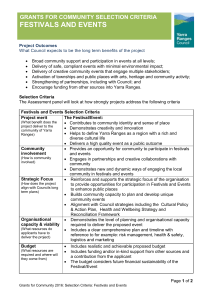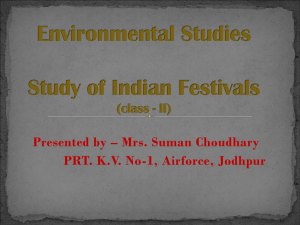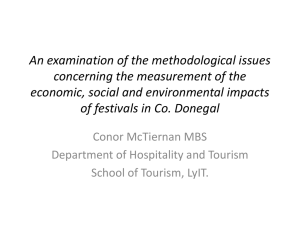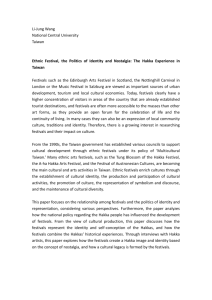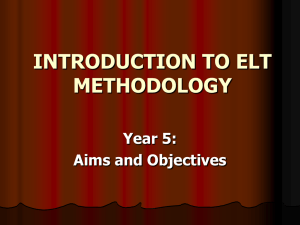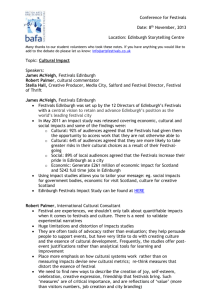“Festival”, in Lexicon, Performance Research, 4, 11, 2006, 54-55
advertisement
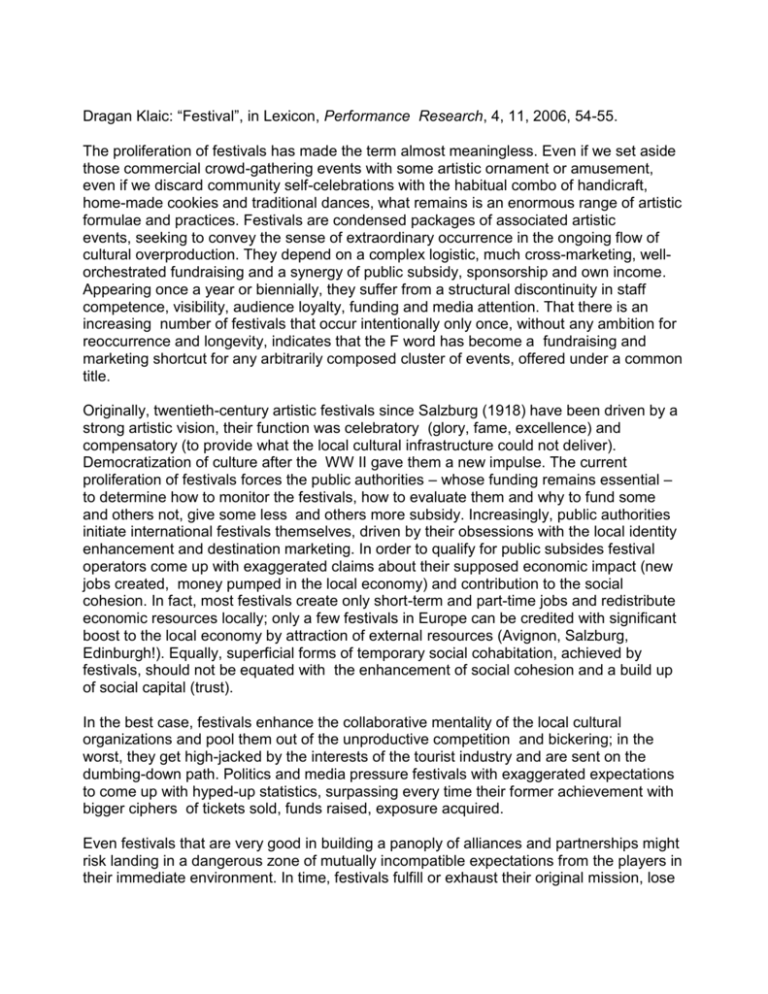
Dragan Klaic: “Festival”, in Lexicon, Performance Research, 4, 11, 2006, 54-55. The proliferation of festivals has made the term almost meaningless. Even if we set aside those commercial crowd-gathering events with some artistic ornament or amusement, even if we discard community self-celebrations with the habitual combo of handicraft, home-made cookies and traditional dances, what remains is an enormous range of artistic formulae and practices. Festivals are condensed packages of associated artistic events, seeking to convey the sense of extraordinary occurrence in the ongoing flow of cultural overproduction. They depend on a complex logistic, much cross-marketing, wellorchestrated fundraising and a synergy of public subsidy, sponsorship and own income. Appearing once a year or biennially, they suffer from a structural discontinuity in staff competence, visibility, audience loyalty, funding and media attention. That there is an increasing number of festivals that occur intentionally only once, without any ambition for reoccurrence and longevity, indicates that the F word has become a fundraising and marketing shortcut for any arbitrarily composed cluster of events, offered under a common title. Originally, twentieth-century artistic festivals since Salzburg (1918) have been driven by a strong artistic vision, their function was celebratory (glory, fame, excellence) and compensatory (to provide what the local cultural infrastructure could not deliver). Democratization of culture after the WW II gave them a new impulse. The current proliferation of festivals forces the public authorities – whose funding remains essential – to determine how to monitor the festivals, how to evaluate them and why to fund some and others not, give some less and others more subsidy. Increasingly, public authorities initiate international festivals themselves, driven by their obsessions with the local identity enhancement and destination marketing. In order to qualify for public subsides festival operators come up with exaggerated claims about their supposed economic impact (new jobs created, money pumped in the local economy) and contribution to the social cohesion. In fact, most festivals create only short-term and part-time jobs and redistribute economic resources locally; only a few festivals in Europe can be credited with significant boost to the local economy by attraction of external resources (Avignon, Salzburg, Edinburgh!). Equally, superficial forms of temporary social cohabitation, achieved by festivals, should not be equated with the enhancement of social cohesion and a build up of social capital (trust). In the best case, festivals enhance the collaborative mentality of the local cultural organizations and pool them out of the unproductive competition and bickering; in the worst, they get high-jacked by the interests of the tourist industry and are sent on the dumbing-down path. Politics and media pressure festivals with exaggerated expectations to come up with hyped-up statistics, surpassing every time their former achievement with bigger ciphers of tickets sold, funds raised, exposure acquired. Even festivals that are very good in building a panoply of alliances and partnerships might risk landing in a dangerous zone of mutually incompatible expectations from the players in their immediate environment. In time, festivals fulfill or exhaust their original mission, lose a sense of urgency, slide into routine but rarely decide to disband themselves or transform into another type of cultural initiative. Consequently, they get de-funded or a rescue is engineered with a new team and a new formula. Festival programming formulae show much crass opportunism (focus every year on another country in order to profit from the promotional drive of the respective government) and a tendency to creep into a highly specialized niche or float in a vague multidisciplinary framework. Real interdisciplinary density and conceptual coherence are quite rare. New media and digital creative platforms make use of festivals, as does a growing range of intellectual and social causes: literature, philosophy and science festivals; feminist, gay, exile, émigré festivals; urban and rural festivals; thematic festivals (e.g. ‘The Body’). From the artistic point of view, festivals are an essential vehicle for the innovation and affirmation of daring artistic practices, for the furthering of the dialectic of the local and the global impulses and resources, for professional development, research, training and discourse advancement. Clever festival programmers succeed in creating an atmosphere of intellectual vibrancy with much professional debate and engage in exemplary audience development that ultimately benefits the regular cultural output. Self-respecting festivals increasingly appear as instigators and co-producers of new work, not just presenters of art made elsewhere. In helping to create some daring new work festivals pool resources and share risks with other co-producers, festivals and venues. How this cultural capital could be expanded and offered to secondary audiences depends of the ingenuity of festivals to transfer their art works to some digital platforms and secure additional distributive channels, cutting through the complex copyright issues. In a cultural-political perspective, festivals dynamize and revitalize artistic practices and cultural constellations by invoking impulses from the outside and by highlighting and empowering local artistic resources. The dispersion of festival events to the various parts of a city re-arranges the mental maps of local topography, modifies perceptions and can even stimulate economic revitalization of peripheral and underprivileged areas. Spaces that were exceptionally and occasionally appropriated for festival programming become sometimes steadily-used venues. Short-term festival initiatives tend to turn themselves into continuous producing-presenting practices, active year around. Educational effects of international festivals remain insufficiently explored, especially for the enhancement of intercultural competence and development of an emerging European citizenship. After the end of the Cold War, festivals have remapped Europe as an integrated and inclusive cultural realm, well beyond the borders of the EU, and become the backbone of international cultural co-operation. Issues related to festival politics, programming, sustainability, audience development, governance and media-dependence could be seen as emblematic for the entire cultural production and presentation, for the fragility of much of the institutional culture, squeezed between the growing indifference of the public authorities, commercial competition and moody consumers as an elusive potential public. Festival research is thus at the cutting edge of the cultural production and cultural policy research today in Europe.

